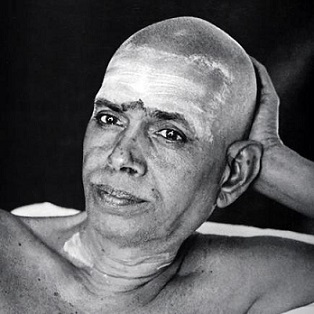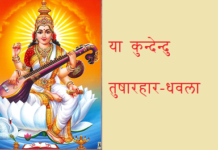Upadesa Saram
Ramana Maharshi composed Upadesha Saram (The Essence of Spiritual Instruction) on the request of one of his devotee. Raman Maharshi composed thirty verses in Tamil, later translated them into Sanskrit. The Tamil version is titled Upadesa Undiyar, and the Sanskrit version is entitled Upadesa Saram.
Upadesa Saram – Sanskrit and English Meaning
- कर्तुराज्ञया प्राप्यते फलम् ।
कर्म किं परं कर्म तज्जडम् ॥ १॥
Action yields fruit,
For so the Lord ordains it.
How can action be the Lord?
It is insentient.
- कृतिमहोदधौ पतनकारणम् ।
फलमशाश्वतं गतिनिरोधकम् ॥ २॥
The fruit of action passes.
But action leaves behind
Seed of further action
Leading to an endless ocean of action;
Not at all to moksha.
- ईश्वरार्पितं नेच्छया कृतम् ।
चित्तशोधकं मुक्तिसाधकम् ॥ ३॥
Disinterested action
Surrendered to the Lord
Purifies the mind and points
The way to moksha.
- कायवाङ्मनः कार्यमुत्तमम् ।
पूजनं जपश्चिन्तनं क्रमात् ॥ ४॥
This is certain:
Worship, praise and meditation,
Being work of body, speech and mind,
Are steps for orderly ascent.
- जगत ईशधी युक्तसेवनम् ।
अष्टमूर्तिभृद्देवपूजनम् ॥ ५॥
Ether, fire, air, water, earth,
Sun, moon and living beings
Worship of these,
Regarded all as forms of His,
Is perfect worship of the Lord.
- उत्तमस्तवादुच्चमन्दतः ।
चित्तजं जपध्यानमुत्तमम् ॥ ६॥
Better than hymns of praise
Is repetition of the Name;
Better low-voiced than loud,
But best of all
Is meditation in the mind.
- आज्यधारया स्रोतसा समम् ।
सरलचिन्तनं विरलतः परम् ॥ ७॥
Better than spells of meditation
Is one continuous current,
Steady as a stream,
Or downward flow of oil.
- भेदभावनात् सोऽहमित्यसौ ।
भावनाऽभिदा पावनी मता ॥ ८॥
Better than viewing Him as Other,
Indeed the noblest attitude of all,
Is to hold Him as the ‘I’ within,
The very ‘I’.
- भावशून्यसद्भावसुस्थितिः ।
भावनाबलाद्भक्तिरुत्तमा ॥ ९॥
Abidance in pure being
Transcending thought through love intense
Is the very essence
Of supreme devotion.
- हृत्स्थले मनः स्वस्थता क्रिया ।
भक्तियोगबोधाश्च निश्चितम् ॥ १०॥
Absorption in the heart of being,
Whence we sprang,
Is the path of action, of devotion,
Of union and of knowledge.
- वायुरोधनाल्लीयते मनः ।
जालपक्षिवद्रोधसाधनम् ॥ ११॥
Holding the breath controls the mind,
A bird caught in a net.
Breath-regulation helps
Absorption in the heart.
- चित्तवायवश्चित्क्रियायुताः ।
शाखयोर्द्वयी शक्तिमूलका ॥ १२॥
Mind and breath (as thought and action)
Fork out like two branches.
But both spring
From a single root.
- लयविनाशने उभयरोधने ।
लयगतं पुनर्भवति नो मृतम् ॥ १३॥
Absorption is of two sorts;
Submergence and destruction.
Mind submerged rises again;
Dead, it revives no more.
- प्राणबन्धनाल्लीनमानसम् ।
एकचिन्तनान्नाशमेत्यदः ॥ १४॥
Breath controlled and thought restrained,
The mind turned one-way inward
Fades and dies.
- नष्टमानसोत्कृष्टयोगिनः ।
कृत्यमस्ति किं स्वस्थितिं यतः ॥ १५॥
Mind extinct, the mighty seer
Returns to his own natural being
And has no action to perform.
- दृश्यवारितं चित्तमात्मनः ।
चित्त्वदर्शनं तत्त्वदर्शनम् ॥ १६॥
It is true wisdom
For the mind to turn away
From outer objects and behold
Its own effulgent form.
- मानसं तु किं मार्गणे कृते ।
नैव मानसं मार्ग आर्जवात् ॥ १७॥
When unceasingly the mind
Scans its own form
There is nothing of the kind.
For every one
This path direct is open.
- वृत्तयस्त्वहं वृत्तिमाश्रिताः ।
वृत्तयो मनो विद्ध्यहं मनः ॥ १८॥
Thoughts alone make up the mind;
And of all thoughts the ‘I’ thought is the root.
What is called mind is but the notion ‘I’.
- अहमयं कुतो भवति चिन्वतः ।
अयि पतत्यहं निजविचारणम् ॥ १९॥
When one turns within and searches
Whence this ‘I’ thought arises,
The shamed ‘I’ vanishes –
And wisdom’s quest begins.
- अहमि नाशभाज्यहमहंतया ।
स्फुरति हृत्स्वयं परमपूर्णसत् ॥ २०॥
Where this ‘I’ notion faded
Now there as I–I, arises
The One, the very Self,
The Infinite.
- इदमहं पदाऽभिख्यमन्वहम् ।
अहमिलीनकेऽप्यलयसत्तया ॥ २१॥
Of the term, ‘I’, the permanent import
Is That. For even in deep sleep
Where we have no sense of ‘I’
We do not cease to be.
- विग्रहेन्द्रियप्राणधीतमः ।
नाहमेकसत्तज्जडं ह्यसत् ॥ २२॥
Body, senses, mind, breath, sleep –
All insentient and unreal –
Cannot be ‘I’,
‘I’ who am the Real.
- सत्त्वभासिका चित्क्ववेतरा ।
सत्तया हि चिच्चित्तया ह्यहम् ॥ २३॥
For knowing That which is
There is no other knower.
Hence Being is Awareness;
And we all are Awareness.
- ईशजीवयोर्वेषधीभिदा ।
सत्स्वभावतो वस्तु केवलम् ॥ २४॥
In the nature of their being
Creature and creator are in substance one.
They differ only
In adjuncts and awareness.
- वेषहानतः स्वात्मदर्शनम् ।
ईशदर्शनं स्वात्मरूपतः ॥ २५॥
Seeing oneself free of all attributes
Is to see the Lord,
For He shines ever as the pure Self.
- आत्मसंस्थितिः स्वात्मदर्शनम् ।
आत्मनिर्द्वयादात्मनिष्ठता ॥ २६॥
To know the Self is but to be the Self,
For it is non-dual.
In such knowledge
One abides as that.
- ज्ञानवर्जिताऽज्ञानहीनचित् ।
ज्ञानमस्ति किं ज्ञातुमन्तरम् ॥ २७॥
That is true knowledge which transcends
Both knowledge and ignorance,
For in pure knowledge
Is no object to be known.
- किं स्वरूपमित्यात्मदर्शने ।
अव्ययाऽभवाऽऽपूर्णचित्सुखम् ॥ २८॥
Having known one’s nature one abides
As being with no beginning and no end
In unbroken conciousness and bliss.
- बन्धमुक्त्यतीतं परं सुखम् ।
विन्दतीह जीवस्तु दैविकः ॥ २९॥
Beyond bondage and release,
Is steadfastness
In service of the Lord.
- अहमपेतकं निजविभानकम् ।
महदिदंतपो रमनवागियम् ॥ ३०॥
All ego gone,
Living as that alone
Is penance good for growth,
Sings Ramana, the Self.



















